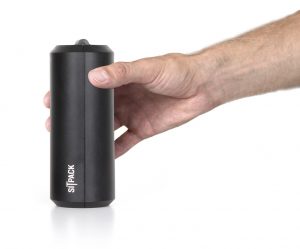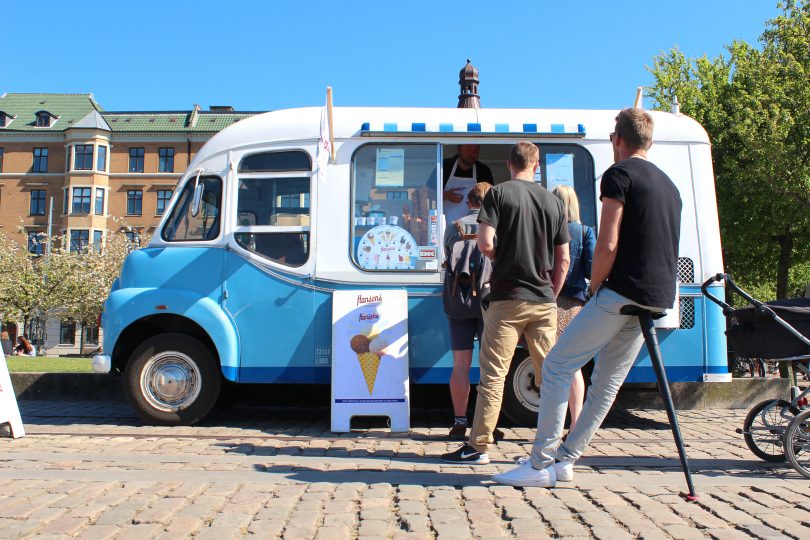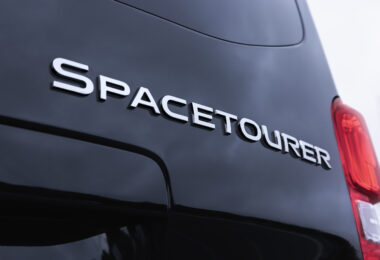We take a load off with entrepreneur Jonas Lind-Bendixen, the inventor of Sitpack.
Jonas Lind-Bendixen recently heard from a friend about a strange figure at the Berlin Marathon. “He saw her from afar,” Jonas recalls, “and it looked like she was just leaning …,” he pauses, “… into midair.”
Of course, she wasn’t actually floating. She was just using the Danish dad and entrepreneur’s first invention: Sitpack, a sleek personal seat that folds down to the size of a beer can. Great for golf, family festivals, waiting in queues, or just any places where seating is limited. The compact travelling seat is durable, stylish and although the mechanism takes a little while to master, it’s the perfect companion for new adventures. It also happens that, from certain angles, Sitpack makes you look like you’re Yoda.
“It’s a really funky, weird thing that you need to get used to, because it is a stick that you’re sitting on, basically,” admits Jonas, who even uses a Sitpack at his work desk. “But it’s still inconspicuous enough for people just to pass by without noticing.”
When they do notice, “most of the time people are envious of you, like in the late afternoon, when they’re coming home from work and they’re really tired, the train’s delayed for thirty minutes, and you just pull out your seat and hang out.”
Festivals to fatherhood
The Sitpack story began while Jonas was waiting for Prince to take the stage at Roskilde Music Festival. “We were trying to sit on speaker supports, folding up pieces of cardboard to make it just a little more comfortable and looking around at people tired after eight days of partying.” The obvious inspiration struck: what if you could buy a pack of beers with its own seat?
That was 2010. It was only in 2014 that a last-ditch crowdfunding campaign gave Jonas the investment he needed. “Kickstarter was my last hope to get any funds, so me and my girlfriend, with our baby daughter, rented out our apartment on Airbnb and borrowed a summer house. I tried to have full focus on emailing, cold-calling and doing whatever I could to rais
e awareness. It took more than a full time job to get the campaign over the edge.”
It didn’t get much easier. Sitpack endured 18 stressful months of delays, at times barely avoiding cancellation. “You don’t have any security at all,” reflects Jonas. “There’s no pension if it all goes down the drain. There’s nobody to pick you up.”
Even so, “I could pick my daughter up from kindergarten or daycare whenever I wanted and take a long weekend in the summerhouse working through the night or while she was napping. That was really positive.”
 Finding perspective
Finding perspective
In fact, Jonas’ family experience has proved invaluable. “It’s really important to control your emotions after you’ve put your heart and soul into a product. You might have been thinking about portable seats for seven years, but you never know when DHL might send your orders the wrong way, a Chinese copy might promote itself with your pictures, or a half-page email about “how stupid your company is, and how horrible everything is about the product and you might arrive.”
One piece of negative feedback can eat up ten positives, but Jonas has also received emails from people who are incredibly thankful for Sitpack, including a woman who broke both kneecaps in a car accident and a man suffering from leukaemia. People for whom “a good tool for little breaks, a way to sit back and re-energise” can be life-changing.
Whatever reactions it elicits, Sitpack is part of a much longer story for the man who invented it. “Ever since I was six years old, I’ve wanted to figure out how to make the new ice-cube bag; something that makes a process easier for everybody.” Jonas won’t let himself get complacent, but it seems like he’s achieved a childhood dream.









